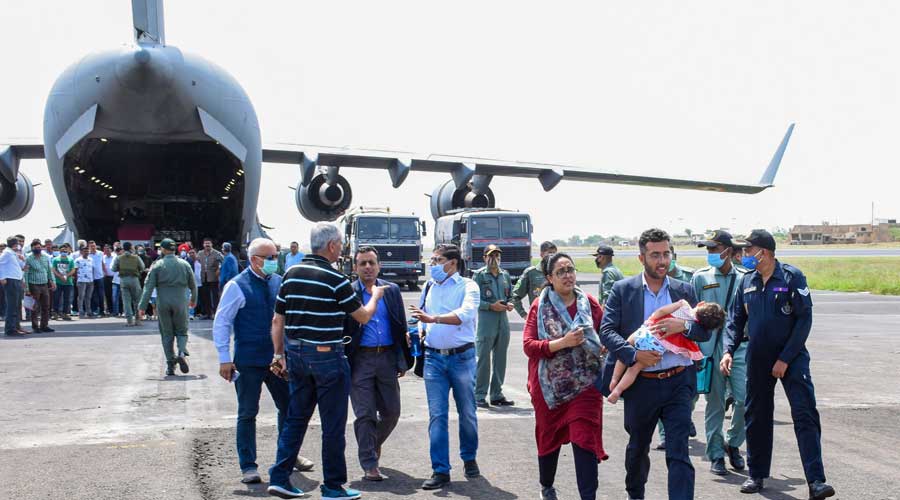Last week, when I landed in Kabul, I was advised by my local Afghan friends not to hire any random taxi at the airport to reach the hotel as the driver could turn out to be a “Talib” who could pose a security threat to me. On Monday, in the heart of Kabul’s diplomatic enclave, I was with the Taliban forces themselves in a green “police” vehicle, which was possessed by the Afghan security forces till the Islamist militants seized power on Sunday.
Last week, I returned to my hotel in the city centre, Shahr-e-Naw, in an ordinary taxi, around 10.30pm after attending a lavish Afghan wedding. On Monday, I was travelling to the airport in an armoured vehicle.
Last week, my local Afghan friends checked my whereabouts as I was moving around the city alone; now I write to them: “Stay safe”.
That’s how Kabul changed in less than a week.
Fear, panic, uncertainty and hopelessness gripped Kabul on Monday as Kalashnikov-carrying men, dressed in shalwar kameez, roamed the streets on foot and in open vehicles.
People who once took pride in saying “no matter what happens, life goes on in Kabul”, mostly locked themselves up in their homes. Most business centres and shops were shut even as Taliban forces insisted there should be “business as usual” and ordered its men to allow locals to resume daily activities and not “scare” them.
On Monday, all checkpoints in the city, once guarded by Afghan police and security forces, were patrolled by the Taliban forces. A group of Talibs carrying AK-47s roamed on the premises of a top city hotel, where many officials of the ministry of foreign affairs of the dissolved Ashraf Ghani government took refuge, fearing for their lives after the collapse of the Afghan government.
Multiple social media posts complained that women in the city received threats from Taliban; in some cases, their male friends sought help from international communities on their behalf for their safe exit from Afghanistan. Many female students in Kabul university preferred to stay back home than attend classes.
On Tuesday, a woman anchor of Tolo News, Afghanistan’s largest private broadcaster which lost several journalists to Taliban attacks over the years, was seen interviewing a Taliban official. Although the anchor looked petrified, the message was loud and clear by the Taliban — women can do their job under the Taliban rule.
A day before, my driver had told me, people are scared for no reason.
“Aap log yahan pe jo baithe hain itni der se, aap ko kuchh kiya? (You have been sitting here for so long, have they done anything to you?)” he asked while I, along with another Indian journalist, waited anxiously for three hours in front of a mosque in Wazir Akbar Khan, the diplomatic enclave in Kabul, to leave Afghanistan along with officials of the Indian embassy as all scheduled commercial flights were cancelled on Monday.
The Taliban men, who were manning the entrance of the diplomatic enclave, a green zone, had denied us entry to the street leading to the embassy. Following the advice of one of the embassy officials, we tried to “negotiate” with them as they may not have preferred two women to be stranded on the road as it goes against their “conservative” and “protectionist” nature. Our first attempt failed. They asked us to come next morning. But we didn’t leave.
Three hours later, when our driver approached them again, they said they would allow us if the embassy officials spoke to their area commander.
Again, in Pashto, one of them told our driver that they didn’t want us to walk alone late in the evening, and they would allow us to go if the embassy sent someone to pick us up.
After a lot of back and forth, when an embassy official managed to co-ordinate with a local Talib mediator, they offered to drop us to the embassy in their newly seized “police” vehicle. While we were barely 100 metres away from the gate of the embassy, the embassy car picked us up.
Before leaving Kabul, when I called to thank my driver for his help, he said: “Phir aaoge toh mujhe batana (Let me know when you come next.)”
After I hung up, I looked at my Afghanistan visa. I wondered where I should apply for my visa next time to come to the “Islamic Emirate of Afghanistan”.
Will there be an Afghanistan embassy run by Talibs in India?
Sonia Sarkar, previously with The Telegraph, went to Kabul as a freelance journalist last week and was evacuated back to India with the Indian embassy staff on Tuesday











